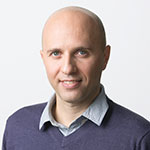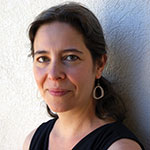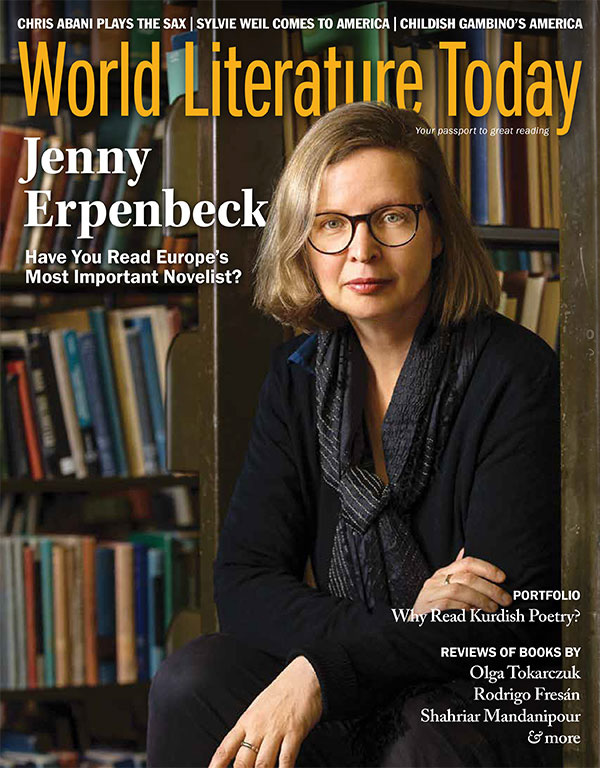De Beauvoir and Sartre on the Kibbutz

While visiting a kibbutz to give a lecture, and after dining on both hot desert-root vegetable soup and sushi, the speaker becomes the listener when someone in the audience completes an anecdote about Simone de Beauvoir and Jean-Paul Sartre.
The terminal at Tel Aviv’s small municipal airport was crowded. All the passengers sat in the waiting area near the doors facing the runways. Two airlines had divvied up the passengers equally, and I stood in line, handed my confirmation to the attendant, and received my boarding pass. Buses shuttled back and forth from the terminal, and about half an hour later I, too, made my way to the runway.
No one was seated to my right on the plane. To my left, beyond the aisle, sat two men wearing boots, with their legs slightly splayed out, passing a cell phone back and forth. They spoke quietly to each other, and smiled secretively, about the pictures they were looking at. They compared and contrasted. They had something to grasp at, or at least so I assumed, but I could not penetrate their world. That is how far removed from me they were.
When I got to Eilat, I was met outside the airport by my driver, who turned out to be the husband of the library director. Very tall, brown moustache. He walked me to the car and we headed to the kibbutz.
The last time I’d been to the resort city, I was in my twenties. I went with another young man and a woman, both friends from Tel Aviv, to stay in a vacation apartment that belonged to my friend’s parents, who, like many other Israelis, had bought a time-share for a vast sum of money. They were only entitled to use the apartment for one month out of every year, and even that was hard to fill. Still, we went down there all those years ago, we sunbathed, and on the beach at night we met people who beckoned us with looks in their eyes, and we went with them to the places one goes to. The three of us: him, her, and me.
That was then. This time I came as a writer and I was dressed like a writer. My rolling backpack contained my laptop, one book in French and another in Hebrew, and some dates, spelt cookies, and so forth. As we drove to our destination, my host recounted his life story, which had begun in Boston and ended—thus far—on the kibbutz. He told me about his children, including a young daughter he’d adopted from a distant land, about his parents in America, and mostly about his brother. In particular, he related an incident that had occurred between them involving a misunderstanding, as well as remorse and guilt, all of which were now thirty years old. There were secrets that emerged in that car, departing one heart and entering another. I kept them secret and did not put them in writing.
I spent the long drive in anticipation, as the sun fell behind the red mountains, the roads became dusty, and the few provisions I’d brought began to dwindle. My host promised me one of two dishes at the kibbutz dining hall: hot desert-root vegetable soup or sushi prepared by a former kibbutznik who was now a well-known chef in New York. By the time we got there, I was confused and exhausted from the journey, and even though my stomach was not grumbling terribly, I found myself asking for both. And so it was that the Japanese food and the desert food were brought to the table and placed before me. I sat there and ate ravenously with my host and his wife, the library director, and a few of their children and grandchildren who were visiting the kibbutz. I did not tell any of them about what I had heard on our drive from Eilat. I held my tongue, even though I was not asked to. That is my temperament and that is my nature.
Another woman, also an American kibbutz member, soon joined us at the table. She wanted to know what I would be talking about at the lecture, which was entitled: “How to Write about Your Family and Live to Tell the Tale.” It was a title that always brought smiles to people’s faces, and it allowed me to talk about topics such as the decline of the family, flourishing, fertility, and decay. I was used to telling my own family stories at these meetings, exposing secrets and hiding even bigger ones behind them. And that is what happened that evening, too, when we sat down half an hour later in a semicircle in the kibbutz library.
At some point the topic that always comes up was raised, namely, the age-old comparison between writing books and having offspring. In this context I told an apocryphal anecdote about Simone de Beauvoir and Jean-Paul Sartre’s visit to Israel in 1967.
The two French philosophers’ trip, I explained, had nothing to do with the Six-Day War. They simply wanted to see a kibbutz with their own eyes, to behold the tangible fulfillment of the collective ideal. It happened on Lehavot Ha’Bashan, in the north, where they talked to a group of kibbutz members, most of whom spoke French. One of the kibbutzniks at that meeting asked Simone de Beauvoir unabashedly: “Madame de Beauvoir, could it be possible that you write books because you do not have children?” Unruffled, she replied: “Sir, could it be possible that you have children because you do not write books?”
That was the anecdote I told them. It usually got a few laughs, and the laughs led to a serious discussion about fertility versus creativity. But this time things were different, because one woman, who had sat on the sidelines and showed no particular interest in anything I had said up to that point, raised her hand and announced: “I was there.”
“You were there?” I repeated dubiously.
“Yes.”
“At Kibbutz Lehavot Ha’Bashan? At the meeting with Sartre and de Beauvoir?”
“I was,” she confirmed.
“And what happened?”
“Exactly what you just told us.”
“Wait, that really happened?” I asked. “You mean, it’s not an urban legend?”
“It happened on a kibbutz, so it couldn’t be urban,” she replied with a grin. “And I am here to confirm, in public, that every word you just said—is the truth. And that’s not all.”
I eyed the other people in the audience. It was difficult to tell if what this woman was saying was new to them. After all, we were on a kibbutz where almost all the residents had arrived together, during the same years, and since then they had raised their crops together, fought for their existence, and were now trying—not always successfully—to compel their children to stay and continue their work, to remain kibbutzniks and reject the seductions of the big city. They all seemed to know this woman very well, and perhaps they knew her story, too. Moreover, I could tell from their expressions that she was telling the truth. And that, indeed, that was not all.
The residents had raised their crops together, fought for their existence, and were now trying—not always successfully—to compel their children to stay and continue their work, to remain kibbutzniks and reject the seductions of the big city.
“When the meeting ended, on that day in ’67,” she continued, “they asked me to accompany Sartre and de Beauvoir to their room. As we walked, a conversation naturally evolved. They were excited about everything they’d seen in Israel, but there was something else that day, and at first I had trouble putting my finger on it. But then I realized that they were simply communicating with each other through me, you see? As if something in those moments, in that structure, between the two of them, was not enough. Something was stuck, their communication had to be shifted. That was how I found myself sitting on the porch outside their room with them for another hour, then two, and then all night long, in total darkness. And we talked. While we talked, they were not the pair of renowned philosophers—we were three simple human beings in a small room on a kibbutz. They did not talk to me about philosophy, they did not talk to me about kibbutzim. That was of no interest to them in those moments. I don’t remember our topics of conversation. Maybe music. Yes, they asked me to play them some music. So we went into their room and I put something on the radio for them, Israeli music, and they were pleased. Then we fell asleep and we got up in the morning, only a short while later, very early. We were awoken.”
“Someone came into the room and woke you?”
“No,” she said, “someone knocked on the door. And Sartre opened it. And Simone and I were still in bed. It was a different era,” she explained with half a smile. “But what do you think?” she then exclaimed: “You think what came out of that whole story was a baby? No. The three of us were past the age. I mean, they were past the age. And it wasn’t about that at all. No baby came out of that night, not even an urban legend came out of it. Nothing. Zilch. And up to this moment, as I tell you this story here, no one has known exactly what I did with them in there. It doesn’t matter anyway. We sat on the porch, then we listened to Israeli music in their room. It’s not much, but it’s something. So in fact, there is something left from that night after all.”
That was what the woman said, and I nodded and ended the evening. A few people came up to talk to me. One man, a veteran kibbutznik, was clutching my latest novel. In his other hand he held a crumpled piece of paper with some questions about the characters, but mostly he wanted to correct a few grammatical errors I had supposedly made. With the utmost patience, I explained his own misunderstandings. It was clear to me, after all, that he had no ill will, only wished to be part of the conversation, to correct and thereby participate. At some point I looked up and saw that the woman, de Beauvoir and Sartre’s chaperone, had left the library.
The next morning my host picked me up from my room. I rolled my little bag behind him to the dining room, where they fried me an omelet and served me a salad, and for dessert they offered me dates, which were the local pride and joy. I said goodbye to the few people who had gathered, and my host drove me to see the palm tree groves and then the citrus orchards, particularly the grapefruit trees. He told me excitedly about these grapefruits, reminiscing about the days when they had fed people on both the Israeli and the Jordanian sides of the nearby border, when the delicious yellow segments had symbolized reconciliation between the two peoples, or at least a shared destiny of sorts.
But now everything around us was arid, the border looked desolate, and no one crossed it from one side to the other, although it was still possible to do so. We made our way to the Eilat airport in silence. My host did not tell me anything more about his children or his parents in America, nor did he confess to the events that had transpired between him and his brother, or elaborate upon the thirty-year-old remorse. It had all been said the night before, and something had happened since then, even though in fact—nothing had happened. I took that silence, just as I had taken the things he had shared with me, and I put it away and kept it hidden, every which way. That is my temperament and that is my nature.
An hour later we reached Eilat, and I shook his hand. Before saying goodbye he placed a large grapefruit in my hands and asked me to take it back to Tel Aviv with me. I did as he asked. Two hours later, after landing, I rolled my bag over the hot asphalt outside the Sde Dov airport and sat down on a bench on the side of the road. Cars charged past me on their way to Tel Aviv and beyond, but I paid no attention to the honking and the tumult. I sat on that bench for a long time, dug my fingernails into the grapefruit, peeled it, perched the peels on my lap, and ate it, segment by segment.
Translation from the Hebrew












